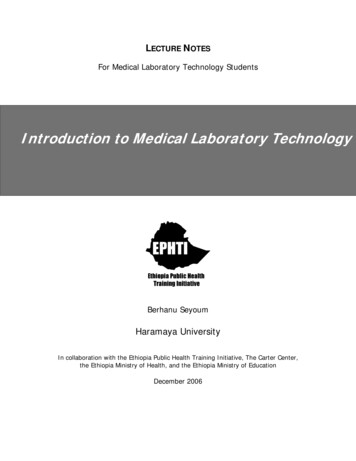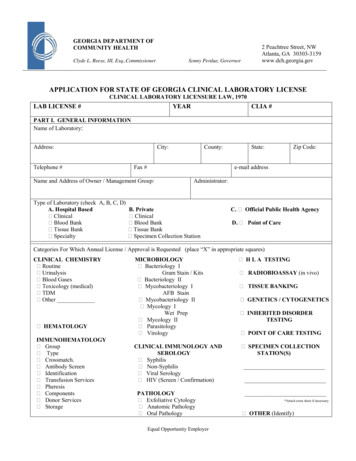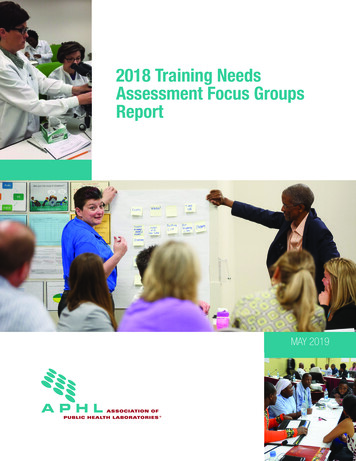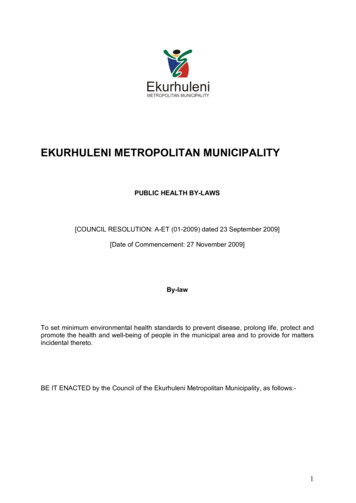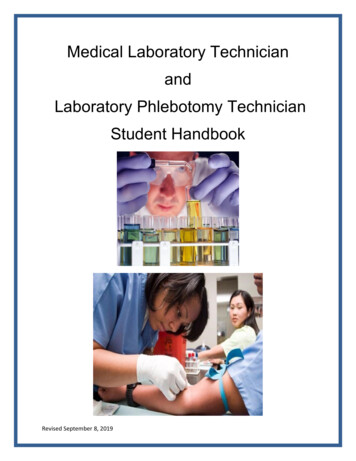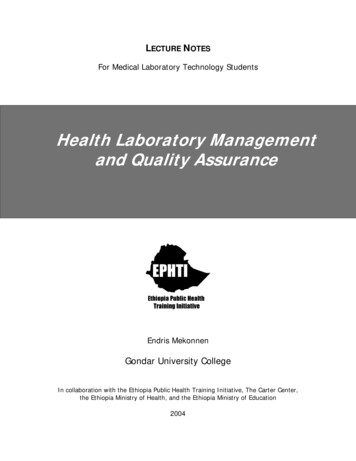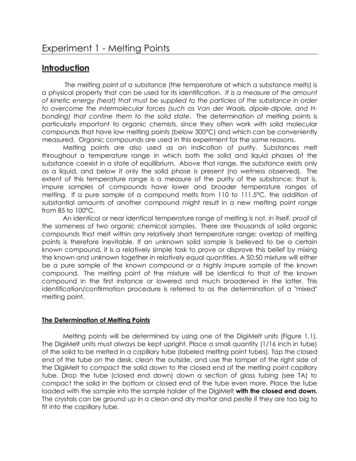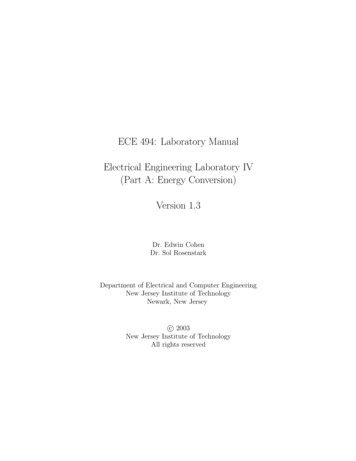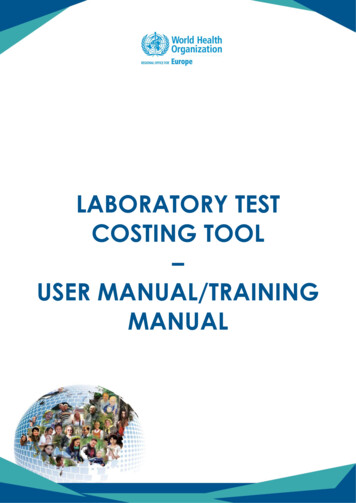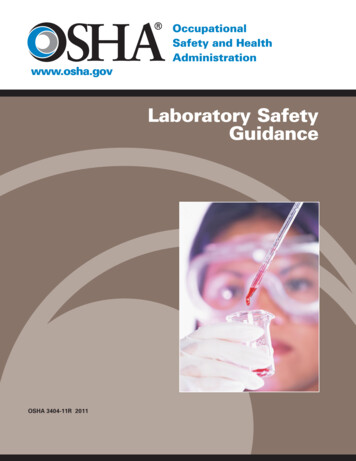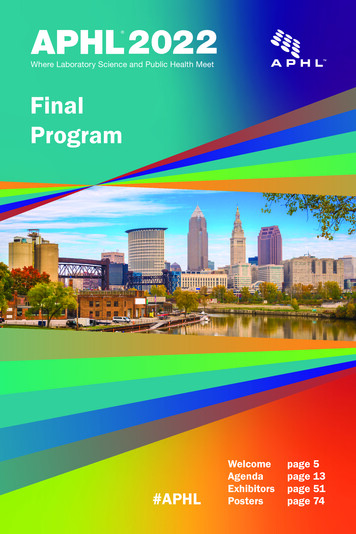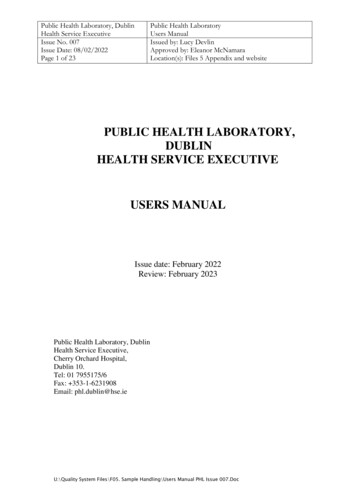
Transcription
Public Health Laboratory, DublinHealth Service ExecutiveIssue No. 007Issue Date: 08/02/2022Page 1 of 23Public Health LaboratoryUsers ManualIssued by: Lucy DevlinApproved by: Eleanor McNamaraLocation(s): Files 5 Appendix and websitePUBLIC HEALTH LABORATORY,DUBLINHEALTH SERVICE EXECUTIVEUSERS MANUALIssue date: February 2022Review: February 2023Public Health Laboratory, DublinHealth Service Executive,Cherry Orchard Hospital,Dublin 10.Tel: 01 7955175/6Fax: 353-1-6231908Email: phl.dublin@hse.ieU:\Quality System Files\F05. Sample Handling\Users Manual PHL Issue 007.Doc
Public Health Laboratory, DublinHealth Service ExecutiveIssue No. 007Issue Date: 08/02/2022Page 2 of 23Public Health LaboratoryUsers ManualIssued by: Lucy DevlinApproved by: Eleanor McNamaraLocation(s): Files 5 Appendix and websiteFOREWORDThe aim of this manual is to aid all users of the Public Health Laboratory, HealthService Executive, Dublin (PHL, HSE, Dublin) gain the optimum service from thelaboratory appropriate to their needs and public health priority. In particular, it willaid the user in selecting and obtaining the most appropriate specimen formicrobiological analysis. The user needs to submit the appropriate requestor, patientunique identifiers and sample information on the relevant PHL HSE Dublin forms forthe optimum test selection. Transporting the appropriate sample to the laboratoryunder the correct conditions, packaging and within the acceptable time frames will aidquality analysis and appropriate interpretation of results. The value of a particularbacteriology test result is still greatly dependent on these pre-analytical, analytical andpost analytical processes.Document control:All changes made to this new issue (Issue 007 of 2022) document are highlighted inyellow.Authors:Dr. Eleanor McNamara, Laboratory Director and ConsultantMicrobiologistLucy Devlin, Quality Manager.U:\Quality System Files\F05. Sample Handling\Users Manual PHL Issue 007.Doc
Public Health Laboratory, DublinHealth Service ExecutiveIssue No. 007Issue Date: 08/02/2022Page 3 of 23Public Health LaboratoryUsers ManualIssued by: Lucy DevlinApproved by: Eleanor McNamaraLocation(s): Files 5 Appendix and websiteCONTENTSGeneral Information and scope of PHL, HSE,Dublin .5Data Protection .6Opening Hours .6Out of Hours service .6Clinical Advice .7User satisfaction . 7PHL Contact Numbers . .8Sample Submission . .9VTEC . .9Campylobacter samples Completion of PHL, HSE .9Request Forms . .9Specimen/Sample Identification . .10Transport of Clinical Specimens/Samples to the Laboratory . .10Food sample Submission .13Water sample Submission 14Sample Rejection .15Sample Retention and Further Test Requests .15Complaints Procedure .16Turnaround Time .16PHL Protocol for Phoning Results . 16PHL Policy on Faxing and E-mailing Reports .17U:\Quality System Files\F05. Sample Handling\Users Manual PHL Issue 007.Doc
Public Health Laboratory, DublinHealth Service ExecutiveIssue No. 007Issue Date: 08/02/2022Page 4 of 23Public Health LaboratoryUsers ManualIssued by: Lucy DevlinApproved by: Eleanor McNamaraLocation(s): Files 5 Appendix and websiteSummary of National Reference VTEC / Campylobacter/ C. difficile Referenceservice and Clinical Microbiology service . 18Summary of the Food Testing Service .20Summary of the Water Testing Service .20Appendix 1 Scope of Micro testing at PHL HSE Dublin . . . 21U:\Quality System Files\F05. Sample Handling\Users Manual PHL Issue 007.Doc
Public Health Laboratory, DublinHealth Service ExecutiveIssue No. 007Issue Date: 08/02/2022Page 5 of 23Public Health LaboratoryUsers ManualIssued by: Lucy DevlinApproved by: Eleanor McNamaraLocation(s): Files 5 Appendix and websiteGENERAL INFORMATION AND SCOPE OF PHL, DUBLINThis user manual provides information on the activities and structure of the PublicHealth Laboratory, Dublin.The Public Health Laboratory is a Health Service Executive laboratory, located withinthe grounds of Cherry Orchard Hospital, Ballyfermot, Dublin 10, and is administeredby HSE Community Healthcare East, CHO 6. It incorporates INAB (Irish NationalAccreditation Board) accredited National reference microbiology laboratory services,regional and local clinical and environment microbiology services and is a designatedOfficial food testing laboratory (S.I. 79/2020 -EU Official Control of Foods). Thelaboratory microbiology scope is for:1. A National VTEC (verocytotoxin E. coli) Reference Laboratory (NRL-VTEC)clinical service. Clinical and environmental samples are analysed for VTECutilising molecular and culture techniques. The VTEC service is accredited toISO 15189 for clinical enteric specimens and ISO 17025 for food, water andenvironmental samples.2. A National sentinel Reference clinical service for Campylobactercharacterisation, which commenced in 2019 and has now been incorporatedinto our routine service.3. A National Clostridioides difficile Reference Laboratory service. (Some partsof testing methodology are currently unaccredited).4. A detailed gastro-enteric clinical microbiology diagnostic service (includingbacteria, viruses, ova and parasites) accredited to ISO 15189, for clinicalmanagement, surveillance and to support and advise on the investigation ofgastro-enteric outbreaks both nationally and regionally.5. An ISO 17025 accredited Regional Public Health food and watermicrobiology analytical service. This is accessed by the Environmental HealthService (EHS), Public Health Doctors and Acute Hospital Facilities.Clinical samples, bacterial isolates, food and water samples are tested formicrobiological analysis only.The results of any unaccredited tests are marked by an asterisk.Clients will be informed of any change to the accreditation status of the Public HealthLaboratory HSE Dublin.It is the policy of the laboratory not to refer tests within the scope of the laboratory, toexternal laboratories. If, in exceptional circumstances, the PHL must subcontract testsfor which it is accredited, PHL would ensure that the work was sent to an accreditedlaboratory where possible and clients would be informed.U:\Quality System Files\F05. Sample Handling\Users Manual PHL Issue 007.Doc
Public Health Laboratory, DublinHealth Service ExecutiveIssue No. 007Issue Date: 08/02/2022Page 6 of 23Public Health LaboratoryUsers ManualIssued by: Lucy DevlinApproved by: Eleanor McNamaraLocation(s): Files 5 Appendix and websiteDATA PROTECTIONThe Public Health Laboratory complies with the data protection and confidentialitypolicies of the HSE, thus ensuring all data is processed in line with the principles ofthe General Data Protection Regulation (GDPR) and relevant Irish legislation.IMPARTIALITYThe laboratory functions as a distinct entity to carry out a range of services, thusguaranteeing its impartiality. Staff are required to sign a declaration of impartiality.The requirement for on-going impartiality is documented.OPENING HOURS:The PHL’s routine service is provided from 9.00 a.m. to 5.00 p.m. Monday-Friday. Alimited service is provided on Saturday mornings from 9.30 a.m. to 12.30 pm andSundays from 10.00 to 12.00 mid-day. Urgent samples are facilitated outside of thesehours. Please contact the laboratory to arrange the receipt of all urgent specimens inadvance of sending them by contacting Cherry Orchard Hospital (COH) switch. See‘out of hours’ contact details below or if during working hours, please phone PHLHSE Dublin at 01-7955174/5 Out of hours, non urgent specimens may be delivered tothe gate lodge of COH and refrigerated overnight until collection by PHL staff.PHL clerical staff are available for phone queries about validated results or for generalenquiries etc. from 9.00 a.m. to 5 p.m. Monday to Friday at 01 7955175/6.OUT OF HOURS SERVICE:A Consultant Microbiologist approved emergency ‘out of hours’ service is availablebetween 5 p.m. and 9 a.m. Monday to Friday and between 12.30 p.m. on Saturday to9.00 a.m. on Monday (i.e.7/7). This service is accessed only by contacting theLaboratory Director or the designated Consultant locum. Their contact details areavailable via the Cherry Orchard Hospital switchboard (01 7955000).Note: The Consultant Microbiologist must be telephoned (via the Cherry OrchardHospital switchboard 01 7955000) in advance for approval to analyse urgentspecimens to be processed out of hours. Users should not telephone the laboratory astelephones are not staffed out of routine hours.U:\Quality System Files\F05. Sample Handling\Users Manual PHL Issue 007.Doc
Public Health Laboratory, DublinHealth Service ExecutiveIssue No. 007Issue Date: 08/02/2022Page 7 of 23Public Health LaboratoryUsers ManualIssued by: Lucy DevlinApproved by: Eleanor McNamaraLocation(s): Files 5 Appendix and websiteCLINICAL ADVICE:Advice regarding diagnosis and treatment of infection is available at all times.Contact numbers are given overleaf. For out of hours advice including infectioncontrol advice, please contact the on-call Consultant Microbiologist via switchboard(01 7955000).Environmental result interpretation (food and waters)Advice regarding interpretation of environmental results on the final report isavailable at all times. Contact numbers are given overleaf.USER SATISFACTION:The Public Health Laboratory operates an on-going process of service evaluation andimprovement to meet the needs and requirements of users. Laboratory managementregularly assesses contributions and complaints received in the laboratory from usersof the Microbiology service. User satisfaction is assessed by either periodicalquestionnaires or User open days. Open days are targeted to specific clients.Please write or email the Chief Medical Scientist or Quality managerU:\Quality System Files\F05. Sample Handling\Users Manual PHL Issue 007.Doc
Public Health Laboratory, DublinHealth Service ExecutiveIssue No. 007Issue Date: 08/02/2022Page 8 of 23Public Health LaboratoryUsers ManualIssued by: Lucy DevlinApproved by: Eleanor McNamaraLocation(s): Files 5 Appendix and websitePHL CONTACT NUMBERS (01 7955175)NameGeneral secretarial officeGeneral enquiries/resultsExt.01 7955175/6E mailphl.dublin@hse.ieDr. Eleanor McNamaraDr. Brian O’Connell01 795521401 Prof. Johannes WagnerChief Medical ScientistAnne Carroll01 7955214wagenerj@tcd.ie01 7955247anne.carroll@hse.ieConsultant MicrobiologistsNational Reference Laboratory(NRL)Service01 7955214Dr. Eleanor McNamara01 7955247Anne CarrollClinical LaboratorySenior Medical ScientistDonal LaniganFood LaboratorySenior Medical ScientistAidan GibsonWater LaboratorySenior ScientistPaul LarkinQuality ManagerLucy DevlinInfection Control Nurse SpecialistTriona Millseleanor.mcnamara@hse.ieanne.carroll@hse.ie01 7955174donal.lanigan@hse.ie01 795521601 7955249aidan.gibson@hse.ie01 795521701 7955250paul.larkin@hse.ie01 7955248lucy.devlin@hse.ie01 7955215triona.mills@hse.ieU:\Quality System Files\F05. Sample Handling\Users Manual PHL Issue 007.Doc
Public Health Laboratory, DublinHealth Service ExecutiveIssue No. 007Issue Date: 08/02/2022Page 9 of 23Public Health LaboratoryUsers ManualIssued by: Lucy DevlinApproved by: Eleanor McNamaraLocation(s): Files 5 Appendix and websiteSAMPLE SUBMISSIONGENERAL GUIDELINESAll samples submitted to PHL should be in the appropriate sterile containeraccompanied by the relevant completed PHL Dublin request form (available onthe PHL website). Samples should be transported to the laboratory as soon aspossible under the appropriate transport conditions (see relevant section below).VTEC, CAMPYLOBACTER, C. DIFFICILE AND CLINICAL SAMPLESUBMISSION:Samples should be submitted with the appropriate accompanying PHL requestform – see PHL website. Collect appropriate clinical specimens in sterile containersbefore commencement of antimicrobial therapy if possible. This is usually possiblefor most mild infections. For more serious infections, antimicrobial therapy shouldnot be withheld pending collection of a specific specimen.If in any doubt as to the appropriate container, please contact the laboratory foradvice.Please send an adequate amount of specimen. As a general rule – ‘the more specimenthe better’.COMPLETION OF PHL CLINICAL REQUEST FORMS:Adequate identification of patient (including at least 2 unique identifiers) samplesis essential for patient safety.The following details should be recorded on the request form: Full Patient NameDOBPatients AddressExternal laboratory number/MRN (where available)GenderDate of sample CollectionWard/SourceRequesting Clinician and contact details (all clinical samples must berequested by a named medical Doctor).Specimen TypeTests requested with relevant clinical details.U:\Quality System Files\F05. Sample Handling\Users Manual PHL Issue 007.Doc
Public Health Laboratory, DublinHealth Service ExecutiveIssue No. 007Issue Date: 08/02/2022Page 10 of 23Public Health LaboratoryUsers ManualIssued by: Lucy DevlinApproved by: Eleanor McNamaraLocation(s): Files 5 Appendix and websiteThose highlighted in bold are mandatory and include patient identifiers.Please ensure that relevant clinical details are included on the request form. Pleaseinclude details if the specimen is associated with an outbreak (provide outbreak code)investigation, in an ‘at risk’ occupation (Health Care or Food Worker) or if there is ahistory of foreign travel, or a specific diagnosis is being considered. All of the abovemay influence the type of test that the laboratory performs.Bacterial isolates for identification, characterisation or toxin testing must beaccompanied by a current VTEC, Campylobacter or C. difficile NRL request form.All PHL Dublin request forms are available from our -dublin/CLINICAL SPECIMEN/SAMPLE IDENTIFICATIONThe following details should be recorded on all specimen containers: Full Patient NameDOBMRN (where available)Date of collectionThose highlighted in bold are essential patient identifiers.Specimens cannot be processed unless there is a minimum of two patient identifierson the specimen which match those on the request form, one of which must be the fullpatient name. If the sample does not have the two patient identifiers or isunsuitable (i.e. leaking) the sample will be rejected and a repeat samplerequested. The sample is still logged in and is recorded as a rejected sample onour Laboratory Information Management System (LIMS). The doctor orhospital laboratory will be phoned to inform them that the sample is not beingprocessed and repeat testing offered.It is laboratory policy NOT to process unlabelled or mislabelled specimens.TRANSPORT OF CLINICAL SPECIMENS/SAMPLES TO THELABORATORY. All samples must be packaged appropriately. It is the responsibility of the persondispatching the sample to the laboratory to ensure that it is packaged correctly andU:\Quality System Files\F05. Sample Handling\Users Manual PHL Issue 007.Doc
Public Health Laboratory, DublinHealth Service ExecutiveIssue No. 007Issue Date: 08/02/2022Page 11 of 23 Public Health LaboratoryUsers ManualIssued by: Lucy DevlinApproved by: Eleanor McNamaraLocation(s): Files 5 Appendix and websitedoes not pose a risk to anyone coming in contact with it during transport or onreceipt in the laboratory (Ref: S.I. No.617 of 2010 Carriage of Dangerous Goodsby Road Regulations 2010).Specimens should be transported and processed as soon as possible; individual testrequirements may invalidate the test request if the samples is too old (48-72h).All Category B biological substances should be packaged according to UN3373 IATAPackaging Instruction 620. Clinical samples should be put into a small plastic specimenbag with enough absorbent material to soak up the entire sample if a leak occurs.Isolates should be on a suitable growth medium (e.g. Nutrient Agar slope) and sealedwith Parafilm beforehand.The Primary container is then placed into a secondary screw top plastic container.The secondary container should be certified leak proof at 95KPa and filled with papertowel or cotton wool so that the specimen is secure and does not rattle in the container.The Secondary container is put into a Category B labelled cardboard box which has anaddress label, UN3373 label and orientation label.Faeces samples are held at room temperature if they are to be processed on the day ofarrival in the laboratory. Other sample types are refrigerated at 2 - 8º C.If processing is delayed sample should be refrigerated at 2 - 8º C for a maximum of 72hours.Urgent samples will be processed upon receipt or discussed with ConsultantMicrobiologist if received out of hours. Clients sending urgent samples should notifythe laboratory in advance as outlined above.1-2g is sufficient for culture of faeces. As multiple samples are rarely indicated fordetection of faecal pathogens, if more than one sample is taken on the same day theymay be pooled.Isolates received for VTEC analysis before 11a.m. will be processed directly from theslope/plate on the day of receipt.For ova and parasite analysis, ideally three stool samples should be collected over nomore than a 10-day period. It is usually recommended that samples are collected everyother day. Unless the patient has severe diarrhoea or dysentery, no more than onesample should be examined within a single 24 hour period, as shedding of cysts andova tends to be intermittent. If E. histolytica or G. duodenalis are suspected and thefirst 3 samples are negative, ideally 3 additional samples should be submitted at weeklyintervals. There are no prescribed limits for the size of sample required, but somelaboratory procedures will require larger quantities than others.For Sellotape slides/perianal swabs suspecting E. vermicularis ova, the sample shouldbe taken between 10pm and midnight, or early in the morning, before defecation orbathing. To prevent deterioration, refrigeration or storage of sample at roomtemperature for up to 48hrs is advised. It is recommended that samples should be takenfor at least 4 to 6 consecutive days. If the results of all these are negative the patientU:\Quality System Files\F05. Sample Handling\Users Manual PHL Issue 007.Doc
Public Health Laboratory, DublinHealth Service ExecutiveIssue No. 007Issue Date: 08/02/2022Page 12 of 23 Public Health LaboratoryUsers ManualIssued by: Lucy DevlinApproved by: Eleanor McNamaraLocation(s): Files 5 Appendix and websitecan be considered free from infection. In practice, more than one sample is rarelyreceived.Samples requesting detection of S. haematobium, it is preferable to obtain total urinecollected over the time period between 10am and 2pm. A minimum of 10ml isrequired. In patients with haematuria, eggs may be found trapped in the blood andmucus in the terminal portion of the urine sample. If the urine cannot be examinedwithin an hour of collection, it is advisable to add 1mL of undiluted formalin topreserve any eggs that may be present. For duodenal/jejunal aspirates, a minimumvolume of 1mL is required.Fresh faeces samples are essential for the examination of trophozoites ideally within 30minutes from the time of collection.SWABS/CONTAINERS USED IN THE PHL HSE, DUBLIN1. Universal container – two types with different apertures are used for collection ofbodily fluids.2. Amies Transport swabs for routine collection of rectal swabs.If you have any other queries, please contact the laboratory.U:\Quality System Files\F05. Sample Handling\Users Manual PHL Issue 007.Doc
Public Health Laboratory, DublinHealth Service ExecutiveIssue No. 007Issue Date: 08/02/2022Page 13 of 23Public Health LaboratoryUsers ManualIssued by: Lucy DevlinApproved by: Eleanor McNamaraLocation(s): Files 5 Appendix and websiteFOOD AND WATER SAMPLE SUBMISSION:FOOD SAMPLES:Foods should be sampled and transported to the laboratory as per “FSAI/HSEGuidance on Sampling of Food for Microbiological Testing (Current Issue)Official Food Sample Under the terms of the Official Control of foodstuffs Directive 93/99/EEC andEU 2017/625 an official food sample must be examined in an official FoodControl Laboratory. The Public Health Laboratory is designated as an officialfood testing laboratory under S.I.79 of 2020. Official food samples shouldhave a documented chain of custody as all food sample results are legallyactionable and all food results are copied to the Food Safety Authority ofIreland as the competent Authority.Specimen Request Form for Food samples.A specimen request form (National Sample Submission Form (NSSF)) shouldaccompany each sample of food to be tested. The receiving PHL staff member mustrecord the following details on the requisition form:1.2.3.4.5.Date and time of receipt of sample.Temperature of sample on receipt if appropriateReceivers nameStorage condition on receiptTick box once sample and form information has been crosschecked.By the EHO:1.2.3.4.5.6.7.8.Name of the EHO delivering sampleName of EHO collecting sampleFood type and codePackaging conditions etcReason for samplingSupplementary information if food poisoning outbreakPremises name and sample description.Any other comments about the sampleSample SizeThe standard minimum routine food sample size in a sterile container for the PHL is100g (25g x 4). This may vary depending on sample availability, for example, if thesample is related to a complaint.U:\Quality System Files\F05. Sample Handling\Users Manual PHL Issue 007.Doc
Public Health Laboratory, DublinHealth Service ExecutiveIssue No. 007Issue Date: 08/02/2022Page 14 of 23Public Health LaboratoryUsers ManualIssued by: Lucy DevlinApproved by: Eleanor McNamaraLocation(s): Files 5 Appendix and websiteWATER SAMPLES:Water samples must be submitted in sterile containers. The sample container mustcontain sodium thiosulphate if the water sample has been treated with a biocide (e.g.chlorine).If in any doubt as to the appropriate container or transport conditions, please contactthe laboratory for advice.Specimen Request Form for Water samplesA PHL Dublin request form should accompany each sample of water sample to betested. The receiving PHL staff member will record the temperature of the containerthat was used to transport the sample.See Table 1 for the minimum volume of sample required and the type of containerrequired.Sample typeTABLE 1Min. Vol. YESYESMains/ Drinking Water500mlEndoscopy water500mlHeater cooler water300mlSwimming quiredHydrotherapy pools500mlRequiredYESWell Water(microbiologically treated)500mlRequired(Ifbiocide)YESWell water untreated500mlNot RequiredYESGroup Scheme (treated)500mlYESGroup Scheme (untreated)500mlRequired(Ifbiocide)Not RequiredSeawaterSurface waterWater for pathogens(eg. VTEC, Salmonella,Campylobacter)500ml/1000ml/2000ml Not Required500mlNot RequiredAt least 1 litreIf biocide presentU:\Quality System Files\F05. Sample Handling\Users Manual PHL Issue 007.DocYESYESYESYESYESYES
Public Health Laboratory, DublinHealth Service ExecutiveIssue No. 007Issue Date: 08/02/2022Page 15 of 23Public Health LaboratoryUsers ManualIssued by: Lucy DevlinApproved by: Eleanor McNamaraLocation(s): Files 5 Appendix and websiteBottled waterPre bottled waterAt least 1 litreAt least 1 litreIf biocide presentYESYESWater for dialysis500mlIf biocide presentYESWater for LegionellatestingAt least 1 litreYESPlease ensure that relevant details are included on the request form. All of the abovemay influence the type of tests that the laboratory performs.The current PHL Dublin food and water sample request forms are available todownload from the -dublin/request-forms.htmlSAMPLE REJECTION:Referred samples that don’t meet the required acceptance criteria will be registeredand discussed with a Senior Scientist or Consultant staff. If the decision is to rejectthe sample, it will be discarded and the reason for rejection noted and informed to thereferring doctor/laboratory/environmental health officer. It is laboratory policy NOTto process unlabelled or mislabelled samples. Where deviating samples are chosen tobe processed, this will be recorded as such and, if applicable, an interpretation will beapplied cautiously.SAMPLE RETENTION AND ADDITIONAL TESTING REQUESTS:Clinical Specimens:Following testing, routine clinical samples are stored at 2 - 8º C for a week or until thefinal report has been authorised.Samples processed in the CL3 laboratory are stored at 2 - 8º C for a minimum of aweek.Requests for additional testing on samples may be possible on a case-by-case basis,once agreed by PHL HSE Dublin staff up to 72 hours after receipt. Please contact thelaboratory as soon as possible if the need for additional testing is identified. If aclient/user requests additional testing verbally, it must be followed up by a writtenconfirmation.If there is a delay in processing a sample, that could compromise patient care, thenthe requestor will be informed of this by PHL.U:\Quality System Files\F05. Sample Handling\Users Manual PHL Issue 007.Doc
Public Health Laboratory, DublinHealth Service ExecutiveIssue No. 007Issue Date: 08/02/2022Page 16 of 23Public Health LaboratoryUsers ManualIssued by: Lucy DevlinApproved by: Eleanor McNamaraLocation(s): Files 5 Appendix and websiteFood and Water Samples;Where practicable, food samples are frozen at -20ºC on the day of testing and retainedin the laboratory for up to three weeks.Water samples are stored in the fridge for up to a week. A sample will be held forlonger than a week should further testing be required and/or until the final confirmedresults are obtained.VTEC, Campylobacter and C. difficile Isolates:VTEC and Campylobacter isolates are logged with unique identifiers and storedindefinitely on freezer beads at -70ºC.COMPLAINTS PROCEDURE:A complaints procedure is in place in the Public Health Laboratory. Initial complaintsmay be received and documented by phone, email or letter.All complaints will be fully investigated in accordance with our quality managementsystem documented protocols (See PHL HSE Dublin Quality Manual and File 8).TURNAROUND TIMES:Turnaround times vary depending on the sample type and the tests requested, and isthe maximum number of days between sample receipt and issue of result.When sending a culture to PHL for VTEC testing, please pick from a non-selectivemedium or check the purity of the isolate before sending. Submitting a pure cultureensures that VTEC PCR results are available within 24 hours. The turnaround time forVTEC isolates is 4 working days.The turnaround time for VTEC and/or routine stools is 6 working days.The turnaround time for routine Campylobacter requests for confirmation andphenotypic antimicrobial sensitivity results is 6 working days.The turnaround time for NRL Campylobacter samples is 6 working days.The turnaround time for NRL C. difficile samples is 6 working days.The turnaround time for enteric viral PCR screen is 3 working days.The turnaround time for whole genome sequencing on isolated bacteria is generallytwo weeks. However, during outbreaks periods of heavy workloads, this will belonger for routine isolates as urgent outbreak isolates will be prioritised.Faeces/Duodenal AspiratesTurnaround times for Ova and Parasites - microscopy and/or PCR result within 3working days. If a sample is for routine culture or VTEC studies as well as O/P, itU:\Quality System Files\F05. Sample Handling\Users Manual PHL Issue 007.Doc
Public Health Laboratory, DublinHealth Service ExecutiveIssue No. 007Issue Date: 08/02/2022Page 17 of 23Public Health LaboratoryUsers ManualIssued by: Lucy DevlinApproved by: Eleanor McNamaraLocation(s): Files 5 Appendix and websitemay take up to 6 working days before the result is reported. Any positive parasiteswill be phoned straight away.Sellotape Slide/Perianal SwabWritten report within 72hrsPHL PROTOCOL FOR PHONING RESULTS:Clinical resultsAll preliminary positive results, of clinical significance are phoned within 24 hrs tothe relevant requesting Doctor (i.e. the requesting medical doctor-GP or relevantPublic Health doctor). Positive results of samples, received from clinical laboratories,are phoned to the requesting laboratory scientific staff or medical personnel. Suchphone calls are documented on LIMS and the final report/cert. of analysisEnvironmental resultsIf a significant pathogen is detected, a preliminary result will be phoned to theEnvironmental Health Officer or laboratory Scientist and then a final hard copy resultdispatched. Such phone calls are documented on LIMS and the final report/cert ofanalysis.PHL POLICY ON FAXING AND E-MAILING REPORTS:The public health laboratory complies with the Health Service Executive’s policies onelectronic transmission of results.U:\Quality System Files\F05. Sample Handling\Users Manual PHL Issue 007.Doc
Public Health Laboratory, DublinHealth Service ExecutiveIssue No. 007Issue Date: 08/02/2022Page 18 of 23Public Health LaboratoryUsers ManualIssued by: Lucy DevlinApproved by: Eleanor McNamaraLocation(s): Files 5 Appendix and websiteA. SUMMARY OF NRL VTEC, CAMPYLOBACTER AND C. DIFFICILESERVICE AND CLINICAL MICROBIOLOGY SERVICE:The PHL provides a National VTEC Reference service for clinical samples. We alsoprovide a sentinel National Reference service for Campylobacter characterisation, andwe were a
The Public Health Laboratory is a Health Service Executive laboratory, located within the grounds of Cherry Orchard Hospital, Ballyfermot, Dublin 10, and is administered by HSE Community Healthcare East, CHO 6. It incorporates INAB (Irish National Accreditation Board) accredited National reference microbiology laboratory services,
